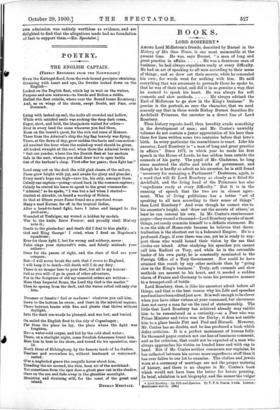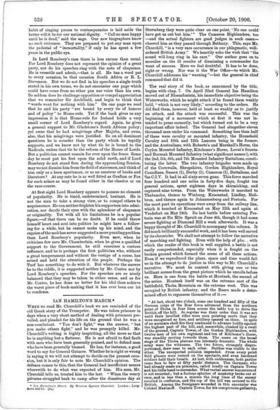BOOKS.
LORD ROSEBERY.*
AMONG Lord Midletoun's friends, described by Burnet in the History of His Own Times, is one most memorable at the present time. He was, says Burnet, "a man of long and great practice in affairs He was a dexterous man of business ; he had always expedients ready at every difficulty. lie had an art of speaking to all men according to their sense of things ; and so drew out their secrets, while he concealed his own ; for words went for nothing with him. He said everything that was necessary to persuade those he spoke to, that he was of their mind, and did it in so genuine a way, that he seemed to speak his heart. He was always for soft counsels and slow methods He always advised the Earl of llifidletoun to go slow in the King's business." So precise is the portrait, so rare the character, that we need scarcely say that in these words Bishop Burnet describes Sir Archibald Primrose, the ancestor in a direct line of Lord Rosebery.
Thus history repeats itself, thus heredity avails something in the development of man; and Mr. Coates's unwieldy volumes do not contain a juster appreciation of his hero than these few lines written some two centuries before that hero's birth. In every particular the resemblance is exact. Like his ancestor, Lord Rosebery is "a man of long and great practice in affairs." Since 1871, in which year he made his first speech in the House of Lords, he has seldom been outside the counsels of his party. The pupil of Mr. Gladstone, he long since mastered the shifts and tricks of government, and though he is hardly so adroit as his ancestor, he is still found "necessary for managing a Parliament." Dexterous, again, is a word that will fit Lord Rosebery as closely as it fitted Sir Archibald, and the living head of the Primroses has also "expedients ready at every difficulty." But it is in the cunning of speech that the two are in closest agree- ment. Who of living politicians has a better "art of speaking to all men according to their sense of things" than Lord Rosebery F And even though he cannot rise to his ancestor's height, and draw out the secrets of others,' at least he can conceal his own. In Mr. Coates's cumbersome pages—they exceed a thousand—Lord Rosebery speaks of most things, yet rarely commits himself to a definite statement. He is on the side of Home-rule because he believes that decen. tralisation is the shortest cut to a federated Empire. He is a professed Jingo, if ever there was one, yet he is ready to sup- port those who would bound their vision by the sea that circles our island. After studying his speeches you cannot call him Radical or Tory, and while he is the ostensible leader of his own party, he is constantly nominated to the Foreign Office of a Tory Government. Nor could he have attained this result by any other methods than by "going slow in the King's business." Truly, soft counsels and slow methods are nearest to his heart, and it needed a sudden alarm of France and Germany to raise his persuasive manner to a trumpet-call of battle. Lord Rosebery, then, is (like his ancestor) adroit before all things, and that is the best reason why his Life and speeches need not have been edited just now. It is well enough to be clever when you have other virtues at your command, but cleverness does not carry a man far on the road of statesmanship. The little that Lord Rosebery has achieved already may entitle him to be remembered as a curiosity,—as a Peer who was Prime Minister and twice won the Derby ; it does not entitle him to a place beside Pitt and Peel and Disraeli. However, Mr. Coates has no doubts, and he has produced a book which defies criticism. It is a perfect monument of human folly. Its thousand pages contain not one line of luminous comment, and as for criticism, that could not be expected of a man who always approaches his victim on bended knee and with cap in hand. But if Mr. Coates neither comments nor explains, he has collected between his covers more superfluous stuff than it has ever fallen to our lot to examine. The clothes and jewels worn at a ceremony of marriage are not the proper material of history, and there is no chapter in Mr. Coates's book which would not have been the better for heroic pruning. In brief, adulation is not biography, and the sooner the vulgar • Lord Rosebery : Life and Speeches. By T. F. G. Coates. 2 vols. London : Hutchinson and Co. Ma.]
habit of singing pans to contemporaries is laid aside the better will it be for our national dignity. "Call no man happy until he is dead," said the sage. Our new biographers know no such reticence. They are prepared to put any man upon the pedestal of "immortality," if only he has spent a few years in the public eye.
In Lord Rosebery's case there is less excuse than usual. For Lord Rosebery does not represent the opinion of a great party, nor do his speeches ring with the note of eloquence. He is versatile and adroit,—that is all. He has a word pat to every occasion, be that occasion South Africa or R. L. Stevenson. But we do not find in his speeches a single truth stated in his own terms, we do not encounter one page which could have come from no other pen nor voice than his own. So seldom does he challenge opposition or compel appreciation that we remember Sir Archibald, and begin to think that "words went for nothing with him." On one page we read that he and his party "are bound by every tie of honour and of policy" to Home-rule. Yet if the book gives us any impression it is that Home-rule for Ireland holds a very small corner of Lord Rosebery's regard. Again, he gives a general support to Mr. Gladstone's South African policy ; yet owns that he had misgivings after Majuba, and owns, also, that his misgivings were justified. So on all dominant questions he is sounder than the party which he tepidly supports, and we know not by what tie he is bound to the Radicals, unless that tie be the reform of the House of Lords. But a politician cannot remain for ever upon the fence. Some day he must put his feet upon the solid earth, and if Lord Rosebery do not stand firm during the approaching Session, may we not dismiss him from the field of statesmen, and think of him only as a keen sportsman, or as an amateur of books and literature ? At any rate he is as well fitted as Grafton or Fox for such solace as may be found either in the classics or on the race-course.
At first sight Lord Rosebery appears to possess no element of popularity. He is timid, undetermined, hesitant. He is not the man to take a strong view, or to compel others to acquiescence. He can neither frighten his supporters into admi- ration, nor dazzle their eyes with the splendour of eloquence or originality. Yet with all his limitations he is a popular figure,—of that there can be no doubt. If he could throw himself heart and soul into politics he might have a follow- ing for a while, but he cannot make up his mind, and the caprice of the mob has never suggested a more puzzling problem than Lord Rosebery's popularity. Even now, when he criticises few save Mr. Chamberlain, when he gives a qualified support to the Government, he still exercises a curious influence, and he is perhaps the first politician who, without a great temperament and without the vestige of a cause, has seized and held the attention of the people. Perhaps the Turf has something to do with it. But whatever the answer be to the riddle, it is suggested neither by Mr. Coates nor by Lord Rosebery's speeches. For the speeches are so nicely balanced that they may be taken in either sense, and as for Mr. Coates, he has done no better for his idol than achieve the worst piece of book-making that it has ever been our lot to condemn.







































 Previous page
Previous page